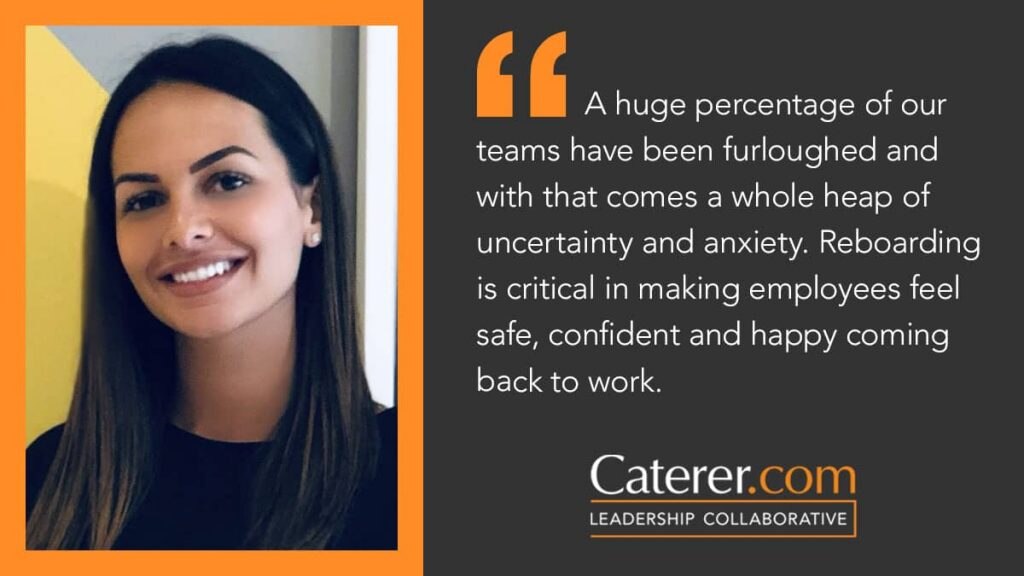Getting reboarding right is critical so that employees feel safe, confident and happy to be at work
Reboarding your team as they come back to work after an extended period away is a hot topic right now as brands strive to generate sales and make up for lost time

Across the hospitality sector, businesses have been bringing their people back to the workplace after, in some cases, nearly 6 months of furlough. So, what’s different?
During a recent Carerer.com webinar on Reboarding, Redeploying & Reskilling: The Role of ‘People People’ we asked Natasha Nagra, Head of Employer Brand & Talent, Kew Green Hotel and Sam Goode, Talent Acquisition Manager at Nando’s UK & Ireland, for their thoughts on practical ways to successfully reboard hospitality people.
Why is reboarding so important?
Natasha opened the discussion,
A huge percentage of our teams have been furloughed and with that comes a whole heap of uncertainty and anxiety. Reboarding is critical in making employees feel safe, confident and happy coming back to work.
The world has changed, and our ways of working have shifted massively in such a small space of time. Enhanced technology, new and changing processes, teams working in incredibly different ways. People who have been furloughed haven’t been part of the changes.
We’ve been working through it and really want to help everyone coming back into the sector manage that change curve and give people space and time to work through it and to understand where and how they now fit in.
Adapt and adjust brand culture
When reboarding, its vital that employers consider and adapt to each person’s personal circumstances, continuously listen to feedback and be willing to adjust processes in line with individual needs and expectations.
Sam was keen to talk about the cultural aspects of onboarding within Nando’s.
For us the onboarding process is very ‘this is our culture, this is the way we do meetings, this is what success looks like in our organisation and this is how you deliver in against that.
Reboarding is different. Some people are probably really happy to get back into the workplace. They want to do their training and get on with it, whereas on the opposite end of the spectrum some people are genuinely concerned and worried about how they’re going to come back and how things will be at work.
Keep talking
Hospitality people are social people and want opportunities to talk about how they are experiencing reboarding.
During lockdown I talked to my team, giving them time and space to chat about their feelings, their journey through furlough, and keeping them really close to what was happening in the business.
Because of this when they started to come back, nothing was a major surprise. There was a need to help our teams deal with new ways of working but actually, they still feel that it’s Nando’s, that they are still part of our culture and they know the change the business is going through. We help them understand the part they play in that. Sam Goode
Listen to the feedback
Natasha commented,
We realised we needed continual feedback from our people who were either working or furloughed. We partnered with the Happiness Index to survey our teams about how they’re feeling. We could then quickly respond with appropriate messages. In a similar vein, we launched a What’s New at Kew series of communication that went out across the business.
Thinking about onboarding, in some ways it is simpler because people don’t join with any preconceived ideas and are learning a new workplace in a new physical environment.
With reboarding you have to do things differently. Things are being done and measured in a new way. The physical space is the same but works differently. There are changed expectations of what good performance looks like and also how teams will be working so it is really important to keep that dialogue open for us.
Top tips for successful reboarding
Finally, we asked Natasha and Sam what their top takeaways from the reboarding process were.
Sam: Treat reboarding like all your people are coming back from parental leave, being long term sick or on a career break. You can’t communicate, listen and then do nothing. You have to communicate, listen and then take action. Give your people time and space to talk about how they feel and then support them.
Natasha: Set objectives early on in the reboarding process because people want to understand what their performance should look like in this new world. The sense of accomplishment in achieving their goals will help people to feel part of the team and have the knowledge they’re contributing towards that success.